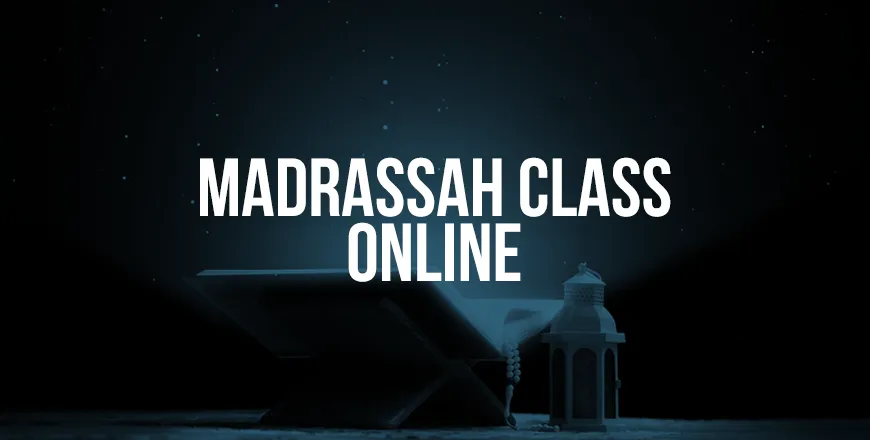Madrassah Class – Online

- Online Madrasah For Children Aged 5 to 16
- Four Days A Week (Monday to Thursday) – students are allocated a fixed time slot
- Dedicated Small Classes (maximum 5 children per class) – Ensuring teachers can listen to and test every student, every day on their daily lessons
- Focused 30 Minute Qur’an/Qa’idah Lessons
- Girls are taught by Female Teachers
- Boys are taught by Male Teachers
After speaking to hundreds of parents from all over the UK and abroad, we understand that some Muslim families do not have access to good quality Islamic education for their children, whereas for others, their children just can’t manage or maintain the intensive hours of a school day, due to which they don’t attend madrasah and end up falling behind. As such, we provide high quality Islamic education at your children’s fingertips; with focused classes, to ensure they receive maximum benefit from their time without them feeling drained out. Alhamdulillah, by Allah’s grace and blessings, we currently cater for 200+ children, and have had new students joining us almost every week since the children’s madrasah was launched online.
Our syllabus covers 3 core subjects: Allowing students to develop good manners, morals and etiquettes; combined with a deeper understanding and a strong foundation in their Islamic knowledge.
Qaʿidah & Qur’an
Qa’idah: Students begin their journey of recitation with their Qaʿidah, by focusing primarily on recognition, correct pronunciation and articulation of the letters, as well as becoming comfortable with the Arabic script and being able to confidently spell out and read words and sentences.
Juz ‘Amm & Qur’an: After completion of the Qaʿidah, the students move on to recite the Juz ʿAmma and thereafter progress on to reciting the Qurʿān. During these two stages, a special focus is given to learning and implementing the rules of tajwid and improving reading fluency.
Memorisation of Du’as & Surahs Du’as & Surahs
Our syllabus also emphasises the memorisation of various everyday essential Du’as and Surahs. Children are tested by teachers regularly on allocated days every week and their progress is tracked throughout the year. The children are also set weekly targets and goals for memorisation depending on their own individual level.
For surah memorisation, children start by memorising the shorter surahs from Juz ‘Amma. They then progress on to memorising various selected longer Surahs such as Surah Yasin and Surah Mulk.
With Du’a memorisation, the children will aim to memorise a set number of Du’as per week. These Du’as are essential everyday Sunnah Du’as. We also provide du’a memorisation aids in the form of videos, where the teacher goes through how to pronounce the letters and words correctly and the meaning of each du’a, followed by the actual Du’as being repeated numerous times. These videos are extremely helpful (especially for younger children) to help them learn and memorise their Du’as.
Along with the correct pronunciation, recitation and memorisation of Du’as and Surahs, various other aspects are also taught – such as the importance and virtues of Adhkar (daily remembrances), the meanings of the Du’as, various Islamic rulings etc.
Islamic Studies
As an Islamic madrasah one of our main focuses, alongside teaching the recitation of the Qur’an, is to provide students with a strong foundation, including their essential Islamic knowledge and a good understanding of Islamic morals, behaviour and social etiquette, ultimately helping them develop into confident upright knowledgeable Muslims, who can not only benefit themselves, but also their families and the wider community.
Some of the aspects we cover are:
Fiqh: the laws of purification, prayer, fasting, hajj, zakat etc.
Aqidah: correct Islamic beliefs essential for Muslims
Sirah: biography of our beloved Prophet Muḥammad (peace and blessings of Allah be upon him), highlighting relevance to our lives and numerous important lessons for us to learn therefrom
Islamic History (Tarikh): spanning the lives of all the previous Prophets and the esteemed Sahabah (prophetic companions), as well as various major events throughout Islamic history
Adab & Akhlaq: Islamic manners, etiquette, behaviour, social-conduct and morals – essential for living a good and rewarding life as a Muslim
The Islamic Studies lessons are delivered by means of twice-weekly recorded videos. Students watch the videos in their own time (outside of class) and then (on allocated days every week) they discuss what they’ve learnt with their teacher, who will talk to them and ask questions to ensure they have understood everything correctly.
Be the first to add a review.
Subscribe for updates.
Subscribe to our newsletter and stay informed about the latest trends, insights, and courses.
Address List
- 311 Calder St, Glasgow G42 7NQ, UK
- +1 234 567 8902
-
info@alfalaahuk.com
contact@alfalaahuk.com




